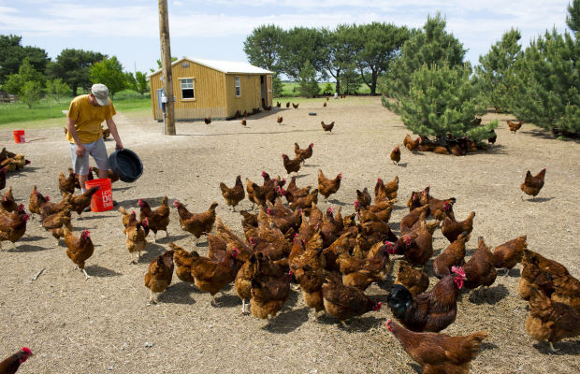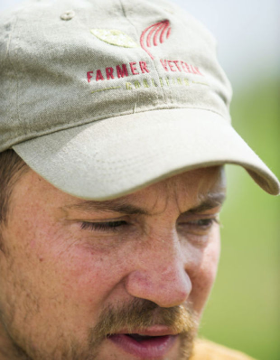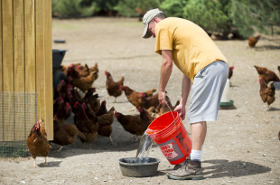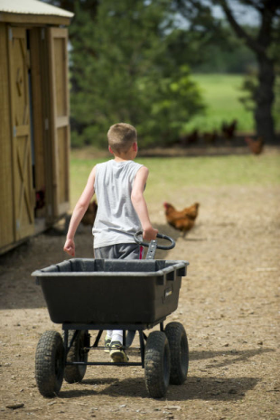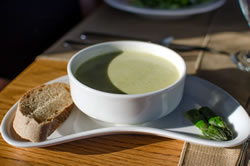 The first thing I noticed when I walked in the doors of Prairie Plate Restaurant, Waverly’s new farm-to-table restaurant, was the way the light inhabited the room, drawing you to the lake view that lay just beyond the windows.
The first thing I noticed when I walked in the doors of Prairie Plate Restaurant, Waverly’s new farm-to-table restaurant, was the way the light inhabited the room, drawing you to the lake view that lay just beyond the windows.
Renee Cornett, head chef and owner of Prairie Plate, greets me at the door and begins to dive into the history of the land. She and her husband, Jerry Cornett, run Lakehouse Farm, a certified organic farm situated roughly fifty yards from the front door of the restaurant. After they started their farm in 2011, they began renovations on the house down by the lake for the restaurant that would eventually open its doors on April 2, 2014.
While their setup and concept for the restaurant would lead you to believe they had lived a lifetime as farmers, their background tells a more unique story.
Renee grew up in Maryland, graduating from the US Naval Academy with a major in mathematics. She served eleven years in the US Navy, the majority as a naval aviator, before retiring in 2001 and attending culinary school at Metropolitan Community College.
Jerry hails from Omaha. He earned a degree in political science from the University of Nebraska at Omaha and then joined the US Navy. Also a naval aviator, his career spanned twenty-one years, including serving as the defense attaché at the US Embassy in Albania, retiring in 2011 with the rank of commander.
When I ask them how they wound up in the farming and restaurant business, they laugh. This is not the first time someone has asked them this question.
“In some ways it doesn’t matter what you do, everybody eats,” Renee says.
She has cooked all her life—for friends, roommates, and her family, including their two children. As Jerry’s retirement approached, they were looking for the next steps. Their life in the Navy had taken them all over the world, including time spent in northern Italy. It was there that the concept of a farm-to-table restaurant formulated.
“You see concepts like this in Europe, northern Italy, even Albania,” Jerry said, “People would travel out into the country to the farm to have a meal that focused on what they grew there.”
In Italy, this concept is called agriturismo.
For the last five to six years of Jerry’s career, they would gather inspiration from restaurants around the world.
Their seasonal menu changes from week to week, depending on what is growing at that moment. Lakehouse Farm grows sixty to seventy different varieties of vegetables and fruit. The items they don’t have on their farm—primarily meat, dairy, and grains—are purchased from local farmers and suppliers. For instance, on the current week’s menu, they featured beef from Range West Beef in Marquette, pork from Erstwhile Farm in Columbus, cheese from Branched Oak Dairy in Raymond, and grains from The Grain Place in Marquette.
As she talks about the logistics of starting up a local food restaurant, Renee’s background in mathematics begins to show.
“You start doing the math. If you’re going to buy local food to start with, local products, how can you make the math work to make it so you don’t have to charge more than people want to come for? And so you start working through some of that,” she says, “I don’t have to truck it in, I know it’s fresh.”
“We want to showcase the region’s ingredients,” Jerry says
The Cornetts are also committed to running both their farm and restaurant as sustainably as possible.
“If we have choices, as much as possible, we try to pick one that’s lighter on the environment, that fits with the rest of the philosophy of what we’re doing. If we can avoid using a light fixture and use a sky light,” Renee smiles and gestures to the other room, “we did that.”
On their farm they practice sustainable farming by using drip irrigation, covered crops, contour farming, crop rotation, and a transplant system where plants begin in their greenhouse before being transplanted to the ground. Additionally, they also compost the kitchen scraps from the restaurant to mix into their soil.
So what incentive does this restaurant have that draws people up from the city?
“From the farm, through the kitchen, to your table,” Renee recites their restaurant motto, “It’s the connection to the place—food from the place—it’s closer to where it started. It’s going to taste better because of that. All the other things—it’s healthier, the economic impact, and all that—everybody is going to have their own section of that discussion that’s important to them, but the ‘tastes better’ is always important to everybody.”
Jerry took me on a tour of the farm, showed me where the food is grown, walked me around the lake as he told me more about the history of how the farm came to be. The sun was about to set, and I left with plans to return the following evening to sample the menu.
It was an even more beautiful evening when I came back. I had snagged the best table in the house, situated in a small alcove of a bay window on the southeast side of the building. This place is a birder’s paradise. Hundreds of birds swoop down, gliding a feather’s width away from the calm, pristine surface of the lake.
The restaurant’s menu is divided into courses: first course, second course, and dessert. Each course provides several options to choose from. They also offer a variety of wines and beers, as well as French press coffee from Cultiva in Lincoln.
What is most important to note about the food is the fact that no flavor is overpowering in any of the dishes. The combinations of flavors work to each other’s favor, and everything is seasoned and salted to perfection.
The Lakehouse Farm Salad is made up of whatever variety of lettuce is best on any given day. From there, Renee adds vinaigrettes and garnishes that compliment the particular type of lettuce available that day. On this particular day, it was garnished with cheese and sunflower seeds and served with slice of bread.
The asparagus and quark soup is also a specialty first course item. Quark is a soft, spreadable cheese that is most common in Germany and other areas of Europe. Branched Oak Dairy Farm provides the quark, which compliments the asparagus for a very satisfying soup. It is garnished with a slice of bread and a halved asparagus tip.
The wilted spinach and feta salad was my favorite of the ones I tried. The spinach was done perfectly—still slightly crunchy but wilted just enough to add that warm spinach flavor combined with garlic and oil. The feta, also from Branched Oak Dairy Farm, was a perfect compliment.
I tried each of the main courses that were available that evening.
First up were the chard rolls. This was the vegetarian option for the evening and was a wonderful surprise. The chard rolls are filled with brown rice and sweet potato and are served over sorrel sauce with a side of asparagus.
The house hickory smoked brisket was served with a side of grilled polenta and roasted asparagus. The meat was very tender. The smoky flavor of the meat married well with the polenta.
The pork chop with rhubarb sauce was my favorite of the three main course dishes I tried. While I don’t traditionally think of a rhubarb sauce on pork, the semisweet sauce really brought out the best of the pork. The dish came with a side of barley and sweet potato pilaf garnished with chive flowerets that provided a beautiful splash of color and a strikingly wonderful flavor.
Two desserts were offered that evening: a rhubarb tart and a hubbard spice cake.
The rhubarb tart was beautiful in appearance; it looked like it belonged in the window of a pastry store in France rather than in Waverly, Nebraska. It was the perfect balance between tart and sweet—just like rhubarb dishes should be.
The hubbard spice cake was the dessert winner for me. The day before, Renee had shown me all about blue hubbard squash. As I helped her carry them from their storage to the kitchen, she explained how they were versatile, like a pumpkin. They are a pale blue-green on the outside and bright orange on the inside. When I saw this on the menu, I jumped at the chance to try it. It didn’t disappoint—still slightly warm from the oven, it was moist and spiced to perfection.
I left, content with having tried something new. And that’s what the farm-to-table experience is all about.
Jerry says it best.
“It’s an experience. It’s not just the food and it’s not just the place. It’s the food AND the place.”
He’s right about that. Prairie Plate is the place where you can come enjoy the beautiful Nebraska scenery and eat the finest dishes with ingredients grown and raised locally. It’s the taste of Nebraska distilled into the food on your plate.
From the farm, through the kitchen, to your table.
Prairie Plate is open Wednesday through Saturday 5–9 p.m., Sunday 12–5 p.m., from April through mid-November. The menu is constantly changing throughout the season, so check their website for weekly menus. A three-course meal plus coffee will run you around $35–43 but will be worth every penny.
Originally published in the June 2014 issue of Prairie Fire. Story by Sara Sawatski.

